
fno.org
|
|
| Vol 18|No 4|March 2009 | |
| Please feel free to e-mail this article to a friend, a principal, a parent, a colleague, a teacher librarian, a college professor, a poet, a magician, a vendor, an artist, a juggler, a student, a news reporter or to anyone else you think might enjoy it. | |||
Reading Between
By Jamie McKenzie, ©2009, all rights reserved. |
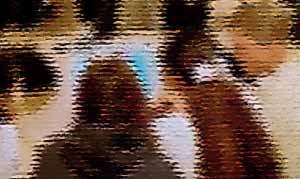 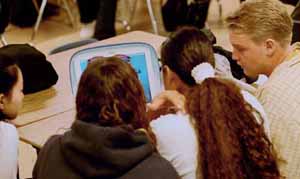  Order You Can Read a Face Like a Book: How Reading Faces Helps You Succeed in Business and Relationships |
||
|
Among other things, students must now learn to cope with the "poverty of abundance" - overwhelming amounts of information - as well as issues of credibility and authority. Reading skills of prior decades remain important but they are not sufficient. Reading a Page Lots of money is now spent on page design - how the information on a page is displayed and arrayed. Many of these aspects of communication will be subtle and subliminal, unless students have learned to consider the techniques employed on each page. Compared to pages in a book from years past, the layout of the page and its visual components may have great impact on one's understanding of the information. Google offers a dramatic example, as its basic page is remarkable in its thin design while its pages reporting search results are crammed with information carefully arranged so that "sponsored links appear around the so-called regular search results in ways that are subtle, as colors and placement are used to make them pretty much unnoticeable. 89 millions hits for laptops! What a great example of the poverty of abundance - a mountain of pages that sets up Google to make money by steering visitors to sponsored links. The information tidal wave actually increases dependency.
Coping with Abundance Not so long ago, schools and students often suffered from too little information, especially information about current events and times. With many school library collections suffering from underfunding, it was too easy to find books about other countries published 20 years earlier. Now we can find heaps of information about other nations that is published currently, but these piles often amount to what some have called an "information landfill" and others have called a "rubbish heap." It brings to mind The Wasteland by T.S. Eliot:
Note the article, "Managing the Poverty of Abundance" at http://www.fno.org/oct06/poverty.html. The article proposes that all students be taught search logic as an antidote to the heaps of sites and pages:
Students as Prospectors For students to read between digital lines, they must become prospectors capable of finding the gold, the oil or the water below the surface. Roget's Thesaurus draws a connection between the act of prospecting and a treasure-hunt. But it may prove to be a treasure hunt through a garbage pail or landfill!
Pick over, turn out, turn inside out Rake through, rifle through, go through Search through, look into every nook and cranny Look or search high and low Search high heaven Sift through, winnow, explore every inch Go over with a fine-tooth comb Pry into, peer into, peep into, peek into Overhaul, frisk, go over, shake down Search one's pockets, feel in one's pockets Search for, feel for, grope for, hunt for Drag for, fish for, dig for Leave no stone unturned, explore every avenue, Cast about, seek a clue, follow the trail and PURSUE the TRUTH! (SOURCE: Roget's Thesaurus of English words and phrases.) For this kind of digging to be successful, students must be skilled at asking probing questions. Probing Questions In previous articles published in FNO and subsequent books, this type of question was outlined in detail. It is one of a dozen question types that students must learn to employ in combinations. They are described in "The Questioning Toolkit" at http://fno.org/nov97/toolkit.html. Probing questions take us below the surface to the "heart of the matter." They operate somewhat like the archeologist's tools - the brushes that clear away the surface dust and the knives which cut through the accumulated grime and debris to reveal the outlines and ridges of some treasure. Another appropriate metaphor might be exploratory surgery. The good doctor spends little time on the surface, knowing full well that the vital organs reside at a deeper level.
The search for insight involves some of the same exploratory elements. In an earlier issue of From Now On (January, 1997), I wrote at some length about the search for "convergence" which guides oil prospecting. The geologist knows that the odds of finding oil are greatly increased when three or four elements are all present in the same location. When it comes to information-seeking, the convergence is And when we first encounter an information "site," we rarely find the treasures lying out in the open within easy reach. We may need to "feel for the vein" much as the lab technician tests before drawing blood. This "feeling" is part logic, part prior knowledge, part intuition and part trial-and-error. Logic - We check to see if there is any structure to the way the information is organized and displayed, if there are any sign posts or clues pointing to where the best information resides. We assume the author had some plan or design to guide placement of information and we try to identify its outlines. Prior Knowledge - We apply what we have seen and known in the past to guide our search. We consider information about the topic and prior experience with information sites. This prior knowledge helps us to avoid dead ends and blind alleys. It helps us to make wise choices when browsing through lists of "hits." Prior knowledge also makes it easier to interpret new findings, to place them into a context and distinguish between "fool's gold" and the real thing. Intuition - We explore our hunches, follow our instincts, look for patterns and connections, and make those leaps our minds can manage. Especially when we are hoping to create new knowledge and carve out new insights, this non-rational, non-logical form of information harvesting is critically important. Trial-and-Error - Sometimes, nothing works better than plain old "mucking about." Push here. Tug there. Try this out! We find a site with so much information and so little structure that we have little choice but to plunge in and see what we can find. Debunking and Deconstructing In these times of spin, deception and false claims, debunking and deconstructing have become survival skills. Things are often quite different from what they appear to be.
When we accept claims and reports at face value there is a substantial risk that we will be hoodwinked. Variants on hoodwink include the following list from the thesaurus:
Good teachers equip students with the questioning skills to challenge the veracity of information, whether it appear on a library site, a "green" site, a politician's site or pages advertising a product. Does the “free range” chicken actually venture outside or is the label a misleading technicality? The door was left open and the chickens elected to remain inside. They may still carry the label “free range” on their package. Can we trust the pharmaceuticals to reveal the real risks? Why did the incidence of breast cancer decline dramatically when the use of hormone supplements dropped off? “Get real!” is a rallying cry for those who wish to cut through the hype, the exaggeration and the pseudo-science that is often used to promote an idea, a product or a plan of action. Sadly, given the prevalence of distortion, skepticism is warranted when anyone is pitching their wares, whether they be manufactured goods, news, government policies or candidates. Sadly, any expectation of verity is naively old-world these days as simulacra and the plastic often substitute for the real. Virtual reality shoves the other reality into the background, as the hip version is often more attractive and entertaining than the original. Beth Orton sings . . .
The article, "Photoshopping Reality" at http://www.fno.org/dec06/photoshopping.html provides program suggestions to develop the media literacy skills of students so they can stand up to the perception management often aimed at them. Additional program suggestions can be found at The Center for Media Literacy (CML) - a nonprofit educational organization that provides leadership, public education, professional development and educational resources nationally. The Center outlines a program called "Five Key Questions That Can Change the World: Deconstructing Media" at http://www.medialit.org/reading_room/article661.html
|
|||
|
Copyright Policy: Materials published in From Now On may be duplicated in hard copy format if unchanged in format and content for educational, nonprofit school district and university use only and may also be sent from person to person by e-mail. This copyright statement must be included. All other uses, transmissions and duplications are prohibited unless permission is granted expressly. Showing these pages remotely through frames is not permitted. |
|||

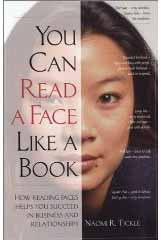 The very term "reading" must be applied more broadly than it was in the past to include the capacity to comprehend any category of information or medium, as in "read a face," "read a building," or "read a situation." Students must now understand how to "read a page" - understanding implicit meanings, context and the intentions of the information producers. They become astute with regard to page design and subliminal manipulation.
The very term "reading" must be applied more broadly than it was in the past to include the capacity to comprehend any category of information or medium, as in "read a face," "read a building," or "read a situation." Students must now understand how to "read a page" - understanding implicit meanings, context and the intentions of the information producers. They become astute with regard to page design and subliminal manipulation. As an increasing share of the texts young people read are now delivered electronically, the challenge of comprehension has shifted in some ways from the days when most words appeared in books, magazines, newspapers or notes passed in class.
As an increasing share of the texts young people read are now delivered electronically, the challenge of comprehension has shifted in some ways from the days when most words appeared in books, magazines, newspapers or notes passed in class. 
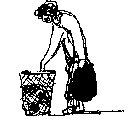 The information prospector must . . .
The information prospector must . . .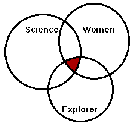 established by creating a logical intersection of search words and key concepts, the combination of which is most likely to identify relevant sites and articles. Probing Questions allow us to push search strategies well beyond the broad topical search to something far more pointed and powerful.
established by creating a logical intersection of search words and key concepts, the combination of which is most likely to identify relevant sites and articles. Probing Questions allow us to push search strategies well beyond the broad topical search to something far more pointed and powerful.